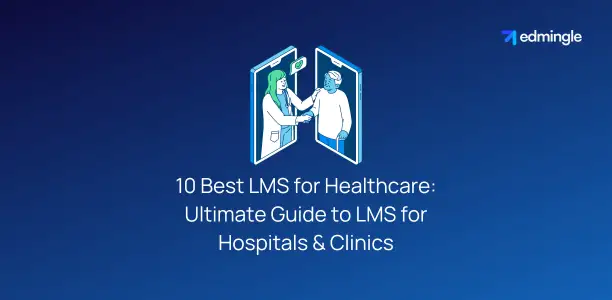
In the world of medical care, every second counts. And knowledge can mean the difference between life and death. At the forefront of aiding this knowledge is an LMS.
Generally known as an LMS for healthcare or HLMS. These aren’t just digital platforms but lifelines that connect medical professionals with latest advancements, techniques and protocols.
In this complete guide, we’ll explore everything you need to know about healthcare LMSs. With their benefits, features & various use cases.
LMS for Healthcare
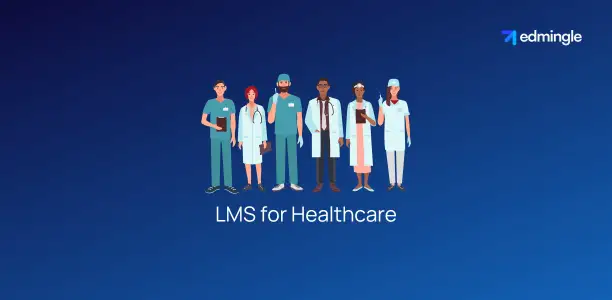
Often termed as HLMS (healthcare learning management system). Its a specialized digital platform tailored to meet the unique training & educational needs of the medical sector.
It facilitates the delivery, tracking and management of medical training content. While ensuring that the healthcare workforce stays updated with the latest medical practices, procedures and regulations.
These often include targeted features. Like compliance training & tracking, hands-on simulations and modules on patient care. Hence, making it an indispensable tool for hospitals, clinics and other medical organizations.
Need of a Healthcare LMS (HLMS)
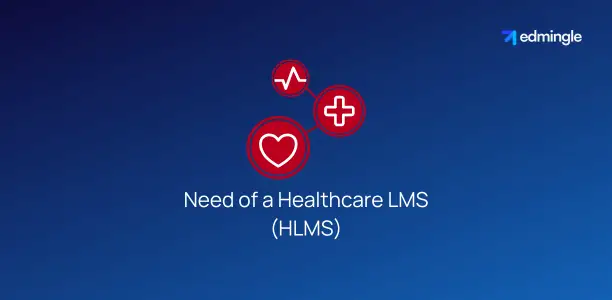
The need for an LMS arises from the sector’s dynamic nature. Where medical advancements and regulations continuously evolve.
- An LMS ensures standardized training & enables healthcare professionals to stay updated with the latest practices. Alongside complying with regulatory standards.
- It offers flexibility in learning while providing a cost-effective training solution.
- It also helps in assessing skills and maintaining crucial records.
An LMS in clinical care is not just a learning tool. But a vital instrument for ensuring quality care, compliance reports and continuous professional development.
9 Major Benefits of a Healthcare Learning Management System
The table below highlights the major benefits an HLMS brings for medical care institutions.
| 1.Standardized Training | Centralizes and standardizes training materials, ensuring consistent education across the board. |
| 2.Continuous Professional Development | Offers a platform for ongoing learning, allowing professionals to stay updated. |
| 3.Regulatory Compliance Management | Facilitates training on and adherence to healthcare regulations. Thus, ensuring that institutions meet necessary standards and avoid potential legal pitfalls. |
| 4.Cost Savings | Reduces your operational cost by eliminating the need for physical training materials, venues and on-site trainers. |
| 5.Flexible Learning | Provides convenience, catering to busy schedules of medical care professionals. |
| 6.Skill Assessments | Features like quizzes, simulations and feedback mechanisms help in evaluating & improving the proficiency of staff. |
| 7.Enhanced Patient Care | Since healthcare professionals are equipped with the latest knowledge & skills, it improves patient outcomes. |
| 8.Scalability | Can easily be scaled and hence is suitable for both small clinics and large hospital chains. |
| 9.Reduced Administrative Burden | Automates many training-related administrative tasks. Thus, freeing up resources for other critical functions. |
In short, an HLMS not only enhances the training experience. But also plays a pivotal role in improving the overall quality of medical services.
9 Important Features of an LMS for Hospitals
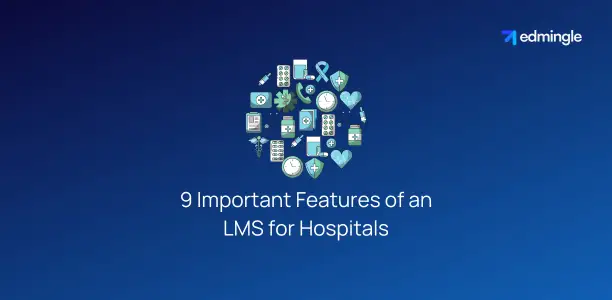
An LMS tailored for healthcare often comes with specialized features to cater to the unique needs of the sector. Here are some key features of an LMS for medical care:
- Regulatory Compliance Modules: Pre-built courses and tracking mechanisms. To ensure adherence to healthcare regulations and standards.
- Skill Assessments & Quizzes: Tools to evaluate the proficiency of healthcare workers. In various medical associations, procedures and knowledge gap areas.
- Simulation-Based Training: Offers virtual hands-on training experiences. Especially useful for surgical procedures and equipment usage.
- Certification & Recertification: Automates the process of issuing & renewing certificates for completed courses & training.
- Real-time Tracking & Reporting: User management, tracking progress, completion rates and performance metrics is crucial. Thus, providing insights into training effectiveness.
- Mobile Learning: Enables access to training materials on-the-go. Catering to the busy schedules of healthcare professionals.
- Collaborative Tools: Features like discussion forums, peer reviews and group projects to foster social learning.
- Secure Data Storage: Ensures that sensitive data & patient information are stored securely.
- Integration Capabilities: Seamlessly integrates with other software systems like HRMS or patient management systems.
By incorporating these features, an LMS for Healthcare becomes a comprehensive tool. That addresses the multifaceted training and development needs of the medical sector.
Market Size of Healthcare LMSs
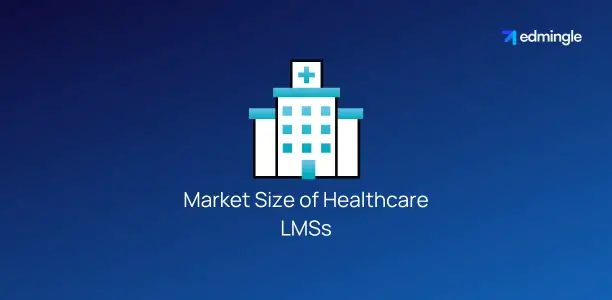
According to a report by Vantage Market Research. The global healthcare learning management system market was valued at USD 1.1 billion in 2022. Its expected to reach a value of USD 4.4 billion by 2030 at a CAGR of 19.1% between 2023 and 2030.
This would depend on various factors. Including technological advancements, regulatory changes and the increasing adoption of digital solutions in healthcare.
Remember, the market size can vary based on the region. Or the specific criteria used for measurement and the source of the data.
11 Use Cases of an LMS for Healthcare (HLMS)
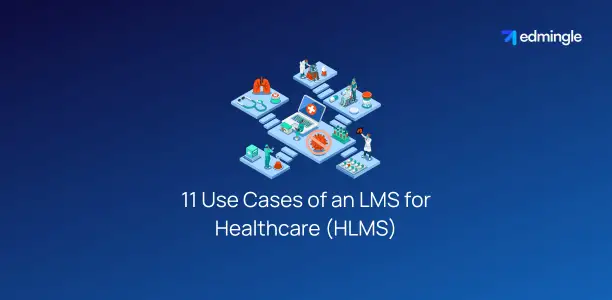
Healthcare LMSs have a variety of applications. Here are some of the prominent ones.
1.Medical Training & Education:
It can train medical students on various procedures, terminologies and best practices. It offers virtual hands-on experiences, like surgical simulations. Thereby maximizing learner engagement.
Read about the perfect LMS strategy to balance screen time with hands-on learning.
2.Continuous Learning:
It can provide ongoing training for healthcare professionals to stay updated with the latest medical advancements. While also offering recertification healthcare courses to ensure professionals maintain their credentials.
3.Regulatory Compliance:
This includes training staff on healthcare regulations and standards to ensure adherence. In addition to tracking and reporting compliance for audits.
4.Onboarding & Orientation:
An HLMS can be used to streamlining the onboarding process for new hires. While ensuring they’re quickly integrated & brought up to speed with hospital procedures & policies.
5.Patient Safety & Education:
An LMS for healthcare providers can be used to offer modules to patients. To educate them about specific conditions, treatments or post-operative care.
6.Equipment Training:
It can also be put into effect to train healthcare staff. On the proper use, maintenance and troubleshooting of new medical equipment or software. It can also be used in medical device companies.
7.Soft Skills Training:
Modules can be created to focus on patient communication, empathy, team-work and other essential soft skills.
Also read about How an LMS Enhances Interpersonal Growth?
8.Research & Case Studies:
It can act as a repository for new research findings, case studies or treatment methodologies. Accessible to a wider audience within the institution or network.
9.Safety Protocols:
Training staff on safety protocols. Like infection control, emergency procedures and patient handling can be done effectively.
10.Administrative Training:
For non-medical staff. Training on hospital administration, billing procedures or patient data management can be organized.
Also Read: LMS for Training.
11.Community Outreach:
Offering online training courses on health and wellness to the community. For promoting preventive care and general well-being can also be facilitated.
These use cases highlight the versatility of a healthcare LMS. Hence, making it an indispensable tool within the medical sector.
10 Best LMS for Healthcare in 2024
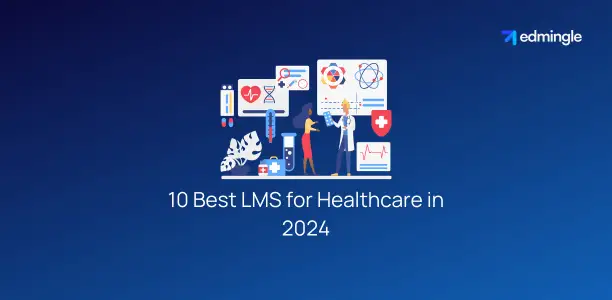
The landscape of healthcare LMSs is vast. And checking out available options can be challenging. But fret not! We’ve done the heavy lifting for you.
Here’s a curated list of the top 10 healthcare LMS platforms in 2024. No matter what your use case is, there’s something here for everyone.
1.Edmingle
Edmingle offers a robust SaaS LMS platform that can be tailored to the specific needs of healthcare institutions. A cloud-based learning management system, it is a rapidly growing and highly commended solution.
Its scalability & flexibility make it suitable for specialized medical training and compliance modules. With a wide range of robust features & exceptional customer support and service, it is a highly reliable offering in the LMS landscape.
2.TalentLMS
TalentLMS is a versatile platform for healthcare. Its strengths lie in easy content integration, certification management and compliance tracking.
3.Docebo
Docebo’s LMS, with its AI-driven capabilities, allows for adaptive learning paths. Thus, ensuring medical professionals receive training tailored to their roles and expertise levels.
4.Absorb LMS
Absorb LMS’s intuitive design, mobile device support and automated reporting features. Cater to the dynamic needs of the medical field.
5.Tovuti LMS
Tovuti offers interactive content creation tools. Its suitable for providing hands-on simulations and complex procedure demonstrations.
6.iSpring Learn
iSpring Learn is a dynamic LMS tailored to meet the specific needs of healthcare organizations. It stands out for its ease of use and seamless integrations.
7.Moodle
Moodle, an open-source LMS, offers unparalleled flexibility and customization options. Hence, making it a popular choice for healthcare education and training.
Read about how Edmingle is better vs. an open-source LMS.
8.Litmos
Litmos is renowned for its scalability & user-friendly interface. It excels in delivering targeted training programs, compliance courses and skill development modules.
9.360Learning
360Learning stands out for promoting a collaborative learning environment. One where healthcare professionals can share knowledge, expertise and best practices.
10.Canvas LMS
Canvas LMS is celebrated for its intuitive design and comprehensive suite of features. Tailored to the needs of educational institutions, including those focusing on healthcare.
Each of these LMS platforms offers unique features and benefits suited to the healthcare sector. And selecting the right one requires a careful assessment of specific needs & goals.
8 Things to Consider When Selecting an LMS for Hospitals
Choosing the right LMS is a crucial yet challenging task. Especially in today’s landscape filled with vast options for every specific need.
Considering the the unique challenges & requirements of the healthcare industry. The following table highlights the important factors to check when selecting an LMS.
| 1.Compliance and Security Features: Adherence to compliance standards such as HIPAA in the United States is necessary. Look for systems that offer data encryption, secure access controls and audit trails. | 5.Reporting and Analytics: Look for an LMS with advanced reporting and analytics tools. These can provide insights into how healthcare training programs are performing. Also identifying areas for improvement & ensuring that compliance requirements are being met. |
| 2.Customization and Flexibility: The LMS should be both customizable and flexible to adapt to the specific needs of your healthcare organization. Also read about white label LMS platforms. | 6.User Experience and Accessibility: The LMS should offer a user-friendly interface with a blended learning environment. Accessibility features are also important to ensure that all users can access and benefit from the learning content. |
| 3.Integration Capabilities: A healthcare LMS should seamlessly integrate with other systems and tools. Like HR systems, clinical software and third-party content libraries. | 7.Scalability: An LMS should be scalable and flexible enough to support the development of new online courses and content. |
| 4.Mobile Learning Support: Healthcare professionals often have demanding schedules and may need to access training materials on-the-go. Mobile accessibility makes it easier for staff to complete their training without disrupting their workflow. | 8.Customer Support and Training: Good support and customer training are vital for the successful implementation and ongoing use of an LMS. It also helps your organization maximize the value of the platform. |
Choosing an HLMS is a significant decision. One that impacts how effectively a healthcare organization can train its employees, comply with regulations and ultimately, deliver high-quality patient care.
Summary
The landscape of healthcare is rapidly evolving. Even more with the technological advancements. You can see this as a symbiotic relationship that supports each other.
In such a scenario, for better trained healthcare professionals, the role of an LMS for healthcare becomes not just beneficial but essential.
It’s clear that an HLMS is not merely a tool for training. But a pivotal element in enhancing the quality of patient care and ensuring regulatory compliance.
FAQs around Healthcare LMS [HLMS]
1.How much do Healthcare LMSs cost?
The cost of an HLMS varies with its features, scalability and the vendor. LMS Pricing can range from free to several thousands of dollars annually. It’s essential to request a quote from vendors based on your specific requirements.
2.What differentiates an HLMS from a general LMS?
While a general LMS provides broad training solutions. An HLMS offers modules on clinical procedures, patient care standards, regulatory compliance and other topics pertinent to the healthcare industry.
3.What effect can an LMS have on the clinical/healthcare industry?
An LMS can have a significant impact on the clinical market. By ensuring that medical professionals are well-trained & updated with the latest clinical practices. This can lead to improved patient outcomes, reduced medical errors and enhanced operational efficiency in clinical settings.






Leave a Reply